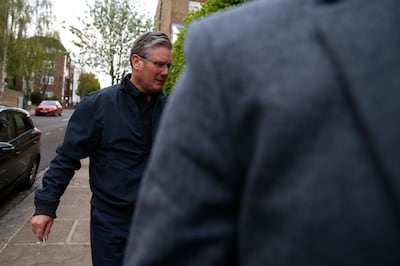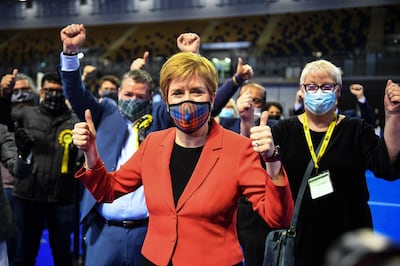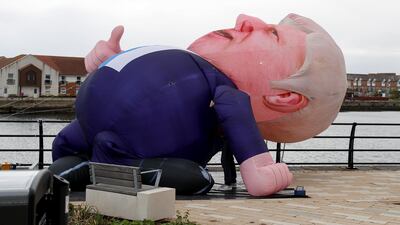Almost the entire UK – with the exception of Northern Ireland – has been counting votes in important elections over the past few days, and London-based newspapers have been trying to make sense of the results.
Some have talked up Prime Minister Boris Johnson as the UK's leader for the next 10 years. The Daily Mail explained it was "the day Boris blew up Labour", annihilating the main opposition party. The Times front page told us "PM eyes decade in power". The catch with these exaggerations is – as we will get to in a moment – that Mr Johnson might indeed be prime minister for 10 years, but the country he leads by 2030 may no longer be recognisable as today's UK.
Undoubtedly the ruling Conservative party he leads has had some astounding election wins – but only in England, not Scotland or Wales. In Hartlepool, a town in the north-east of England and a Labour stronghold for about six decades, voters gave the Conservatives a thumping victory. They were also triumphant in many English local council elections.
But the more significant story isn't "Conservatives up, Labour down". It is that the election results reveal how profoundly split and disunited the once United Kingdom really is. Labour did well in Wales, matching its best ever result as the largest party in Senedd Cymru, or the Welsh Parliament, and holding on to power for the next five years. In England's big cities and metropolitan regions – London, Greater Manchester, Liverpool City Region – Labour mayors were re-elected.
Of course, there is no doubt that in the working-class areas of England, the Conservatives have pulled off a series of remarkable victories, capturing traditional Labour votes. The reason is not just to the success of the coronavirus vaccination programme. It’s also the fact that the Labour party does not seem to have a coherent message about anything many English voters really care about, including Brexit.
Perhaps the most revealing insight comes from Khalid Mahmood, a Labour MP from Birmingham, who claimed that Labour has lost touch with ordinary British people. "A London-based bourgeoisie, with the support of brigades of woke social media warriors, has effectively captured the party. They mean well, of course, but their politics – obsessed with identity, division and even tech utopianism – have more in common with those of Californian high society than the kind of people who voted in Hartlepool.”
What is truly revealing here is that, as well as losing voters among the people Mr Mahmood represents, here is a Labour MP attacking other Labour voters as “woke social media warriors” from the “bourgeoisie". The party is offending and destroying all parts of its own traditional base. For more than a century, Labour was a party of three groups, centre-left intellectuals, manual workers and die-hard socialists. But now, as Mr Mahmood reveals, the party is composed of various groupings who seem to loathe each other, and don’t try to hide it.

The party leader, Keir Starmer, is attacked within the party for being ineffectual, intellectual, a metropolitan lawyer, and not left-wing enough. But the real problem isn’t the leader. It’s the Labour party itself. The only Labour leader who has been a big-vote winner in the past 50 years is Tony Blair.
But before Mr Johnson settles back to a decade in power, the underlying problem in all these results is that the country he is nominally in charge of is moving apart. Mr Johnson and his party speak loudly – but for England only, and even there, not for some of its great cities.
The Scottish National Party has been in government in Scotland since 2007, even though the Scottish parliamentary voting system makes it difficult for any one party to have an overall majority. This year, those parties in favour of a second Scottish independence referendum – the SNP and the Greens – have together a clear mandate to demand an independence referendum. They represent more than 50 per cent of Scots voters. But Mr Johnson says he will refuse to allow another referendum, and while that may make him more popular in England, in Scotland he is already widely disliked and distrusted. Refusing a referendum will make that worse.

Politics for the next decade in the UK will be full of competing nationalisms and divisions. To many Scots and others, the Conservatives are an "English" nationalist party. They speak of "Britain" but they mean England only. The Labour administration in Wales has gained greatly in confidence and will be more assertive. Northern Ireland remains uneasy and unstable, sometimes violently so. And while the big winner in these elections seems superficially to be Mr Johnson, the real winner will be those demanding much more devolution for England's cities, new powers for Wales and independence for Scotland.
Perhaps Mr Johnson, with a talent for shape-shifting, may yet find a convincingly sincere vision for a truly United Kingdom. After all, as the American comedian George Burns put it: “The key to success is sincerity. If you can fake that you've got it made.”
Gavin Esler is a broadcaster and UK columnist for The National


